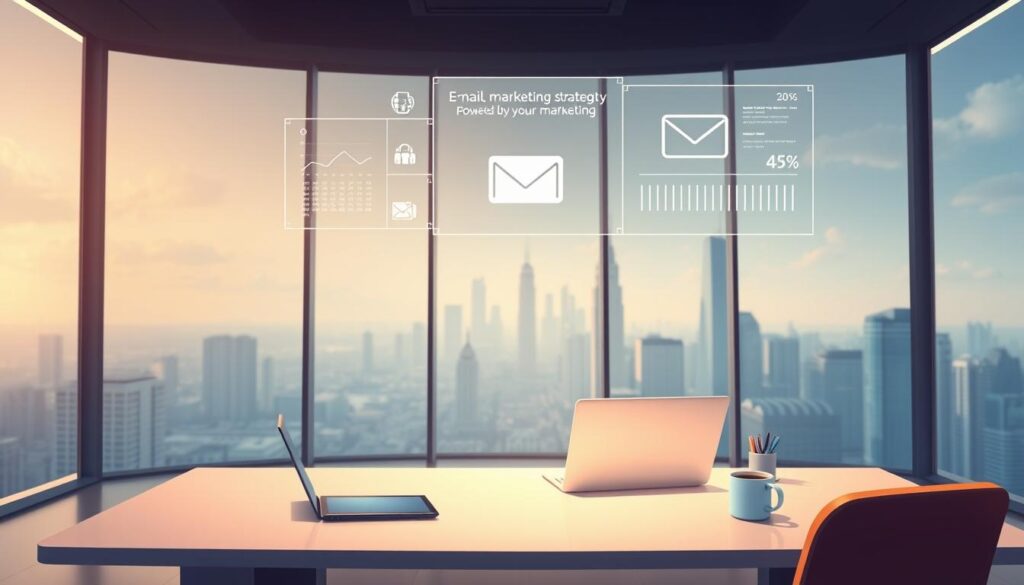In today’s fast-paced digital landscape, email marketing remains a cornerstone of effective communication. With the rise of AI, marketers are unlocking innovative ways to enhance engagement and drive results. Research shows that outbound emails have increased by 15%, making it crucial to stand out in crowded inboxes.
AI is revolutionizing email marketing by personalizing content and optimizing send times. For instance, tools like Copy.ai and Smartwriter are helping brands craft compelling subject lines and tailored messages. This shift isn’t just about technology—it’s about creating meaningful connections with your audience.
Improved open rates mean more than just numbers; they signal higher engagement and better deliverability. By leveraging AI, businesses are seeing significant gains, with open rates rising from 20% to 35%. This translates to a 25% increase in lead generation and a 15% boost in sales revenue.
Our mission is to make AI accessible to everyone, providing expert insights to empower your email marketing strategy. Whether you’re a seasoned pro or just starting out, this guide will break down complex topics into practical, actionable steps.
Key Takeaways
- AI enhances email marketing by personalizing content and optimizing send times.
- Improved open rates can increase lead generation and sales revenue.
- Tools like Copy.ai and Smartwriter help craft compelling subject lines and messages.
- AI makes email marketing accessible and effective for all skill levels.
- Personalization and dynamic content significantly boost engagement.
Understanding the Role of AI in Email Marketing
AI is transforming how businesses connect with their audiences through email campaigns. By leveraging machine learning, marketers can now personalize content and automate workflows with unprecedented precision. This shift is not just about technology—it’s about creating smarter, more meaningful connections with customers.
What is AI in Email Marketing?
AI in email marketing refers to the use of machine learning algorithms to enhance and optimize campaigns. These algorithms analyze vast amounts of data, such as customer behavior and engagement patterns, to deliver highly personalized experiences. For instance, AI can segment email lists based on preferences, ensuring that each subscriber receives content tailored to their interests.
Predictive vs. Generative AI in Campaigns
Predictive AI focuses on analyzing historical data to forecast future outcomes. It can determine the best send times for emails or identify which subject lines are likely to perform well. On the other hand, generative AI excels at creating content, such as crafting personalized messages or optimizing email subject lines for higher open rates.
| Feature | Predictive AI | Generative AI |
|---|---|---|
| Primary Function | Analyzes data to predict outcomes | Generates content based on data |
| Example Use Case | Optimizing send times | Creating personalized email copy |
| Benefit | Improves timing and relevance | Enhances creativity and personalization |
By combining predictive and generative AI, businesses can streamline their email marketing efforts, from strategy to execution. This integrated approach not only boosts efficiency but also leads to higher engagement and conversion rates. To learn more about data privacy in AI-driven campaigns, visit our privacy policy.

Revolutionizing Engagement with AI for email marketing
AI is transforming how businesses engage with their audiences through email campaigns. By leveraging machine learning, marketers can now personalize content and automate workflows with unprecedented precision. This shift is not just about technology—it’s about creating smarter, more meaningful connections with customers.
Personalization and Dynamic Content
Personalization is key to engaging today’s subscribers. AI enables hyper-personalization by tailoring messages to individual preferences, leading to higher open rates. For instance, personalized emails have a 26% higher open rate compared to non-personalized ones. Dynamic content adapts in real-time to customer preferences, ensuring relevance and increasing engagement likelihood.
Optimizing Subject Lines and A/B Testing
A/B testing, powered by AI, helps determine the best-performing subject lines and email variations. For example, generative AI contributed to a 10x in campaign responses. This process ensures continuous improvement, leading to higher click-through and conversion rates.
| Feature | Benefit | Example |
|---|---|---|
| Predictive Analytics | Optimizes send times and subject lines | Boosts open rates by up to 30% |
| Generative AI | Creates personalized content | Increases conversion rates significantly |
| Dynamic Content | Adapts to real-time preferences | Enhances customer engagement |

By combining predictive and generative AI, businesses enhance both creative and technical aspects of campaigns, reducing manual effort and speeding up execution. This integrated approach not only boosts efficiency but also leads to higher engagement and conversion rates.
Integrating AI into Your Email Marketing Strategy
As businesses strive to stay ahead in the competitive digital landscape, integrating AI into email marketing strategies has become essential for driving engagement and conversions. This section provides a clear roadmap for implementing AI effectively, ensuring seamless integration with existing workflows and enhancing overall campaign performance.
Step-by-Step Implementation
To begin, assess your current email marketing strategy. Identify areas where AI can add value, such as personalization or send-time optimization. Next, prepare your data by ensuring your CRM and email lists are up-to-date and segmented based on customer preferences.
Choose an AI-powered email marketing tool that aligns with your business needs. Options like Mailchimp’s AI and HubSpot Breeze Copilot offer advanced features such as dynamic content generation and predictive analytics. Start small by automating routine tasks, then gradually expand to more complex functions as your team becomes more comfortable with the technology.
Leveraging Advanced Email Marketing Tools
Advanced tools empower marketers to create highly personalized campaigns. For example, AI can analyze customer behavior to recommend products, similar to Amazon’s “Recommended for you” section, which drives 35% of their revenue. These tools also enable A/B testing for subject lines and content, optimizing open rates and engagement.
| Tool | Function | Benefit |
|---|---|---|
| Mailchimp’s AI | Content optimization and predictive analytics | Boosts open rates and personalization |
| HubSpot Breeze Copilot | Dynamic content generation | Enhances engagement with tailored messages |
By aligning AI capabilities with broader marketing goals, businesses can achieve higher efficiency and customer satisfaction. Start with simple automations and scale as confidence grows, ensuring AI enhances rather than disrupts your existing workflows.
Learn more about leveraging AI in your strategy by visiting our resource page.
Overcoming Challenges and Ensuring Ethical Implementation
As businesses embrace AI-powered email marketing, they must navigate a complex landscape of ethical and operational challenges. Ensuring responsible use of technology is crucial for maintaining trust and compliance.
Managing Data Privacy and Compliance
Data privacy is a top concern in AI-driven email marketing. With 85% of consumers worried about their personal information, businesses must prioritize transparency and security. Implementing robust encryption and regular audits helps safeguard customer data and ensures compliance with regulations like GDPR. A clear privacy policy, easily accessible to your audience, fosters trust and accountability.
Addressing Technical and Operational Hurdles
Technical challenges, such as system integration and maintenance, require skilled personnel. Companies must invest in talent and continuous training to manage AI tools effectively. Starting with simple automations and gradually scaling ensures smooth adoption without overwhelming teams. Regular updates and monitoring of AI systems prevent biases and errors, ensuring reliable performance.
Balancing automation with human oversight is key to ethical AI use. While AI optimizes campaigns, human input ensures creativity and empathy. To learn more about implementing AI ethically, visit our resource page.
Conclusion
As businesses continue to evolve in the digital age, the integration of advanced technologies like AI has become a game-changer for email marketing strategies. This guide has explored how AI-driven tools and techniques can elevate your campaigns, from hyper-personalization to dynamic content optimization.
Key insights include the significant boost in open rates—up to 26% higher for personalized emails—and the enhanced efficiency brought by AI-powered tools like Mailchimp’s AI and HubSpot Breeze Copilot. These tools not only streamline workflows but also ensure that your email campaigns resonate more deeply with your audience.
To succeed, adopt a strategic approach. Start by identifying areas where AI can add value, then gradually integrate these tools into your existing workflows. This balanced approach ensures that technology enhances your efforts without overwhelming your team.
Our mission is to make AI accessible to everyone, providing insights that empower your marketing strategy. By embracing these advancements, you can drive sustainable growth and foster stronger customer connections. The future of email marketing is bright, and with the right tools, your business can thrive in this evolving landscape.












